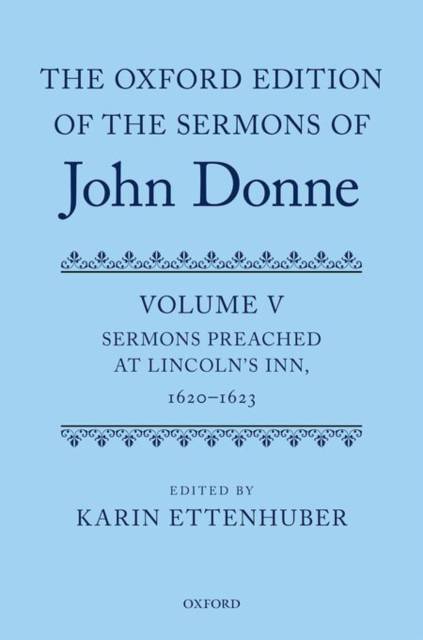
- Afhalen na 1 uur in een winkel met voorraad
- Gratis thuislevering in België vanaf € 30
- Ruim aanbod met 7 miljoen producten
- Afhalen na 1 uur in een winkel met voorraad
- Gratis thuislevering in België vanaf € 30
- Ruim aanbod met 7 miljoen producten
Zoeken
Oxford Edition of the Sermons of John Donne
Volume V: Sermons Preached at Lincoln's Inn, 1620-23 (UK)
Katrin Ettenhuber
€ 443,45
+ 886 punten
Omschrijving
This volume is the third volume to be published in The Oxford Edition of the Sermons of John Donne. The edition presents the sermons arranged according to place of preaching and --within that and as far as possible--chronology, and in accordance with the principles of modern textual scholarship. This volume contains the ten sermons preached by Donne at Lincoln's Inn between 1620 and 1623. It includes the sermon Donne preached at the dedication of the Inn's new chapel in May 1623, supplies new dates for seven of the ten sermons in the volume, and provides fresh evidence for the place and sequence of Donne's sermon series on the Trinity. In each case an authoritative text has been established by freshly collating multiple copies of the seventeenth-century print editions. The Introduction describes the institutional and physical context of Donne's Lincoln's Inn sermons, analyses his style of preaching and doctrinal positions, and explains the nature of his recourse to forms of
legal thought and argument. For the first time, the sermons appear with a full critical apparatus: headnotes to each sermon describe its textual state and supply local historical context and suggestions for further reading, while extensive commentaries trace Donne's use of his sources, translate passages in foreign languages, and gloss important and unfamiliar words.
legal thought and argument. For the first time, the sermons appear with a full critical apparatus: headnotes to each sermon describe its textual state and supply local historical context and suggestions for further reading, while extensive commentaries trace Donne's use of his sources, translate passages in foreign languages, and gloss important and unfamiliar words.
Specificaties
Betrokkenen
- Auteur(s):
- Uitgeverij:
Inhoud
- Aantal bladzijden:
- 448
- Taal:
- Engels
- Reeks:
Eigenschappen
- Productcode (EAN):
- 9780199563258
- Verschijningsdatum:
- 10/02/2016
- Uitvoering:
- Hardcover
- Formaat:
- Genaaid
- Afmetingen:
- 155 mm x 224 mm
- Gewicht:
- 839 g

Alleen bij Standaard Boekhandel
+ 886 punten op je klantenkaart van Standaard Boekhandel
Beoordelingen
We publiceren alleen reviews die voldoen aan de voorwaarden voor reviews. Bekijk onze voorwaarden voor reviews.











